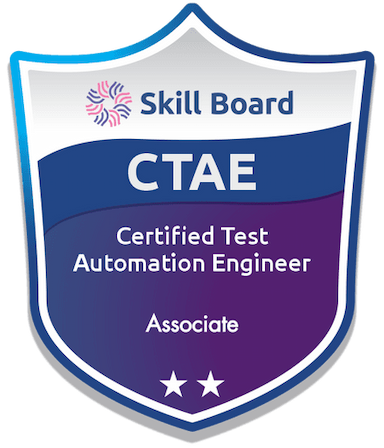- Developers, QAs and Automation Engineers with 1+ years of experience developing and automated testing scripts using Selenium.
- Knowledge of fundamentals of QA manual and automated methodologies.
- Knowledge of HTML, CSS, etc.
- Knowledge of Selenium including its ecosystem of drivers, bindings, plugins, etc.
- Knowledge of various tools and framework design
- Scripting and debugging skills
- Certified Associates are required to recertify after 3 years either by taking a recertification assessment or through continuing education credits.
- Continuing education credits may be earned by taking equivalent or higher industry certification.
| Domain | Weightage |
|---|---|
Part 1 - QA Basics and Test Automation Manual Testing Concepts, Types of Testing, Test Case preparation, Test Execution, Defect Tracking, Different types of Test Automation tools, Basic understanding of Automation Frameworks - Data Driven, Keyword Driven and Hybrid frameworks | 5-10 % |
Part 1 - Basic understanding of Selenium Suite & WebDriver Selenium IDE, Selenium RC, Selenium Grid, WebDriver, Selenium installation, Selenium Architecture, WebDriver Language bindings, Multi browser testing support | 5-10% |
Part 1 - Interacting with GUI Elements Selenium locators and dealing with WebElements, Handling Editboxes, dropdowns, checkboxes, option buttons and WebTables. Performing Keyboard and mouse actions, Handling alerts, Interacting with multiple windows, Handling frames, Understanding of HTML DOM, Working with XPath - Contains, Sibling, Ancestor, AND OR, Parent, Axes, Creating XPath from DOM structure, CSS Selectors, Performing Drag and Drop operations | 30-50 % |
Part 1 - Test Script Development and Test Execution Designing test scripts, Page Object Model, navigating to web pages, browser operations, Capturing Screenshots, JavaScriptExecutor in Selenium WebDriver, Designing scripts to support multi browser test execution, Headless Browser Test execution, WebDriver Waits - Implicit Wait, Explicit Wait and Fluent Wait, Desiredcapabilities & Chrome Options, Selenium Grid, Selenium Grid Architecture, Setting up Selenium Grid, Remote Webdriver | 30-50% |
Part 1 - Java for Selenium Automation OOPs concepts, Variables and Data types, Arrays, ArrayLists and HashMaps, Control structures - branching and looping, Classes and Objects, Inheritance and Extending classes, Method overriding and overloading, Interfaces and Abstract classes, Strings & Important string methods, Exception handling, Basic File operations. | 20-30 % |
Part 2 - Practical Exam Practical assessment test will be conducted to analyze candidates’ hands on expertise in design and development of selenium test scripts. Logical and Java programming skills will be tested using Eclipse IDE. Test scripts with faulty code snippets will be shared. Candidate is expected to find Logical/Programmatical/Test case implementation related issues, fix them, and convert it into a working test script. Focus will be more on ‘Interacting with GUI Elements’, ‘Test Script Development and test execution’ and ‘Java for Selenium Automation’ topics. | 100% |

